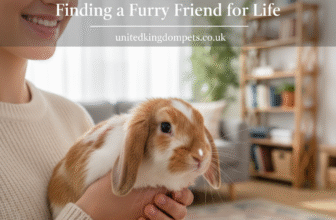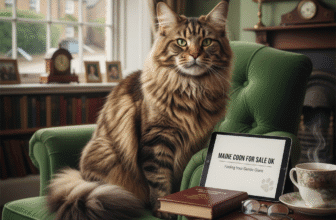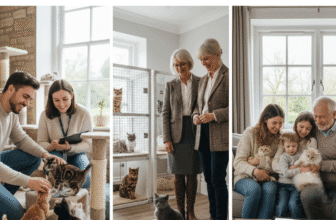
Thinking of Buying a Parrot? Your Ultimate Guide to Finding a Feathered Friend in the UK
The thought of bringing a parrot into your home is an exciting one. These intelligent, vibrant, and often comical birds can form incredibly deep bonds with their human companions, filling a house with colour, sound, and personality. However, the decision to buy a parrot is not one to be taken lightly. It’s a commitment that can span decades, requiring significant investment in time, money, and emotional energy. If you’re searching for a “parrot for sale” in the UK, this comprehensive guide is your essential first step. We’ll navigate the complexities of choosing the right species, finding a reputable source, understanding the costs involved, and preparing your home for your new feathered family member.
Why a Parrot? Understanding the Commitment
Before you even begin browsing adverts, it’s crucial to understand what you’re signing up for. Parrots are not like cats or dogs. They are wild animals at heart, only a few generations removed from their native habitats. Their intelligence is often compared to that of a human toddler, and with that comes a similar level of need for stimulation, social interaction, and patience.
Consider the lifespan. A small Budgerigar might live for 5-15 years, but a larger species like an African Grey or a Macaw can live for 50, 60, or even 80+ years. This means your parrot could potentially outlive you. It’s a lifelong commitment that requires planning for the bird’s future care. They are also creatures of habit and thrive on routine. Changes in their environment or your schedule can cause them significant stress, which can manifest as behavioural problems like feather plucking or aggression.

Then there’s the noise. Parrots are naturally vocal. They greet the sunrise with squawks, chatter throughout the day, and may scream to get your attention. While the volume varies by species, no parrot is silent. If you live in a flat with thin walls or have neighbours close by, this is a serious consideration. Finally, there’s the mess. Parrots are masters of destruction, joyfully shredding toys, flinging food, and pooping wherever they please. A clean cage and home require daily dedication.
Choosing the Right Parrot Species for You
With over 350 species of parrots, the choice can be overwhelming. Your lifestyle, living space, and experience level will dictate which bird is the best fit. Let’s explore some of the most popular companion parrots available in the UK.
For the Beginner
- Budgerigars (Budgies): Small, energetic, and relatively inexpensive, Budgies are a fantastic starting point. They can learn to talk and are incredibly playful. Their smaller size means their mess and noise levels are more manageable for first-time owners.
- Cockatiels: Slightly larger than Budgies, Cockatiels are renowned for their gentle and affectionate nature. They are excellent whistlers and can learn to mimic words. Their charming head crest is wonderfully expressive, making it easy to read their mood.
- Parrotlets: These tiny birds pack a huge personality into a small package. Often described as “pocket parrots,” they can be feisty and bold but form strong bonds with their owners. They are less noisy than many larger species.
For the Intermediate Owner
- Conures: This diverse group includes species like the Green-cheeked Conure and the Sun Conure. They are known for their playful, clownish antics and affectionate personalities. Be warned, however, that some species, particularly the Sun Conure, can be exceptionally loud for their size.
- Quaker Parrots (Monk Parakeets): Quakers are highly intelligent and are known for being prolific talkers. They are energetic and love to build nests, even within their cages. It’s important to note that you may require a licence to keep them in the UK, depending on your location, due to their potential to become an invasive species.
- Caiques: Often called the clowns of the parrot world, Caiques are bundles of energy. They hop, dance, and love to play. They are not strong flyers but are incredible acrobats. They require a lot of stimulation to keep them from becoming bored and destructive.
For the Experienced Owner
- African Greys: Famed for their incredible intelligence and speaking ability, African Greys (both Congo and Timneh species) are complex birds. They are emotionally sensitive and require a stable, enriching environment to thrive. They are prone to feather-plucking if stressed or bored and are a huge time commitment.
- Amazon Parrots: Amazons are bold, confident birds with excellent talking potential. They can be outgoing and love to be the centre of attention. However, they can go through a hormonal “bluffing” stage during adolescence, which can involve challenging behaviour and aggression if not managed correctly.
- Macaws: The giants of the parrot world, from the large Blue-and-Gold to the smaller Hahn’s Macaw. They are stunningly beautiful and can be incredibly affectionate, but their size means everything is bigger: the cage, the toys, the food bill, the mess, and especially the beak. Their beaks are immensely powerful and can cause serious injury, making them unsuitable for homes with young children.
- Cockatoos: Known as “velcro birds” for their extremely cuddly and demanding nature, Cockatoos require an immense amount of attention. They can be incredibly loud, and their emotional needs are intense. They are prone to severe separation anxiety and behavioural issues if not given near-constant social interaction.
Where to Find a Parrot for Sale in the UK: The Good, The Bad, and The Unethical
Once you’ve researched your ideal species, the next crucial step is finding a reputable source. This is perhaps the most important part of the process, as it will determine the health and temperament of your future companion.
Reputable Breeders
A good breeder is passionate about the welfare of their birds above all else. When visiting a breeder, look for the following signs:
- Cleanliness: The environment should be clean, spacious, and well-ventilated. Cages should be appropriately sized and filled with enriching toys.
- Healthy Birds: The birds should look healthy, with bright eyes, clean vents (the area where they excrete waste), and smooth, vibrant feathers. They should be active and alert.
- Socialisation: A good breeder will handle the chicks regularly to ensure they are well-socialised and comfortable around people. They should be happy to let you interact with the parent birds (from a safe distance) and the available babies.
- Knowledge and Questions: The breeder should be a fountain of knowledge and should ask you just as many questions as you ask them. They will want to ensure their precious chick is going to a suitable, prepared, and loving home.
- Hatching and Weaning Records: They should be able to tell you the bird’s hatch date and will never sell an unweaned baby. Forcing a new owner to hand-feed is dangerous and a huge red flag. The bird must be fully weaned onto a healthy diet (not just seed).
Look for breeders registered with organisations like the Parrot Society UK. While not a guarantee, it’s often a good starting point.
Adoption and Rehoming Centres
Given the long lifespan of parrots, many sadly outlive their owners or are given up when circumstances change. Reputable charities and rescue centres across the UK are often full of wonderful birds looking for a second chance. Adopting a parrot can be an incredibly rewarding experience. These centres will vet you thoroughly to ensure a perfect match. The bird will come with a known history (where possible), and the centre will provide lifelong support. While some rescue birds may have behavioural issues stemming from past trauma, the rescue staff will be honest about this and will work with you to ensure you have the skills to manage it.
What to Avoid
- Online Marketplaces and Gumtree: While it’s possible to find genuine sellers, these platforms are rife with scammers and unscrupulous backyard breeders. Be extremely cautious. Never, ever pay for a bird you haven’t seen in person. If a deal seems too good to be true, it almost certainly is.
- Pet Shops: The quality of pet shops varies wildly. Some are excellent, with knowledgeable staff and well-cared-for animals. Others keep birds in poor conditions, sell unweaned babies, and offer little to no aftercare advice. Do your research thoroughly before buying from any pet shop.
- Bird Fairs or Markets: These can be incredibly stressful environments for birds, crammed into small cages with hundreds of strangers. It’s a breeding ground for disease, and it’s impossible to know the background or health of the bird you are buying.
The Costs of Parrot Ownership: It’s More Than Just the Purchase Price
The initial cost of the parrot itself can range from £20 for a Budgie to several thousand pounds for a large Macaw. But this is just the tip of the iceberg. You must budget for a range of ongoing expenses.
- The Cage: This is one of the most important purchases. It needs to be large enough for the bird to stretch its wings fully and play. For larger parrots, a high-quality cage can cost upwards of £500-£1000.
- Veterinary Care: You’ll need to find an avian vet, which is a specialist. An initial check-up, plus an annual wellness exam, is essential. Emergency vet care for a bird can be very expensive. Pet insurance is highly recommended.
- Food: A seed-only diet is unhealthy and can lead to malnutrition. Your parrot will need a high-quality pelleted diet, supplemented with fresh vegetables, fruits, and bird-safe grains. This can be a significant monthly cost.
- Toys: Parrots need to chew and shred to keep their minds stimulated and their beaks in good condition. Toys are not a luxury; they are a necessity. You will need a constant rotation of new toys as they will be destroyed, which is their purpose!
- Accessories: Food and water bowls, perches of various sizes and textures, a play stand for outside the cage, and cleaning supplies all add up.
- Damage to Your Home: Expect some level of destruction. A parrot can easily chew through furniture, skirting boards, and electrical wires if left unsupervised.
Preparing Your Home and Your Life
Before you bring your bird home, you need to parrot-proof your space. Many common household items are toxic to parrots. This includes non-stick cookware (Teflon fumes are fatal), aerosols, scented candles, air fresheners, and many cleaning products. Certain foods like avocado, chocolate, alcohol, and caffeine are also highly toxic.
You need to plan how the parrot will fit into your daily routine. They need several hours of supervised time outside their cage every single day for socialisation and exercise. You can’t just leave a parrot in a cage all day and expect it to be a happy, well-adjusted pet. They need to be part of the family flock.
Bringing a parrot into your life is a journey filled with joy, laughter, and a unique companionship that is hard to describe. They are not simple pets; they are intelligent, emotional beings that demand respect and a deep commitment. By doing your research, choosing the right species for your lifestyle, finding an ethical source, and preparing your home and budget, you are setting the foundation for a wonderful, lifelong relationship with a truly extraordinary creature.







